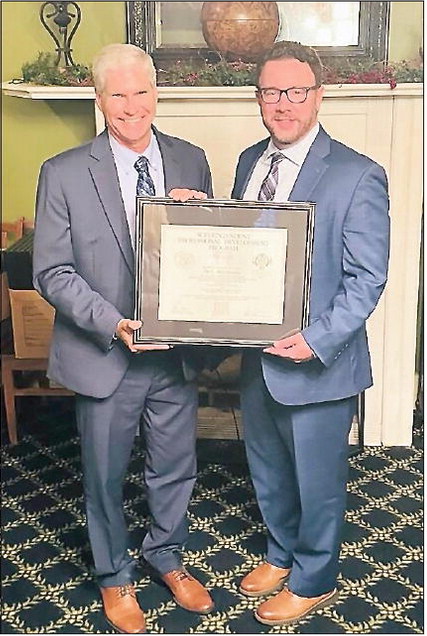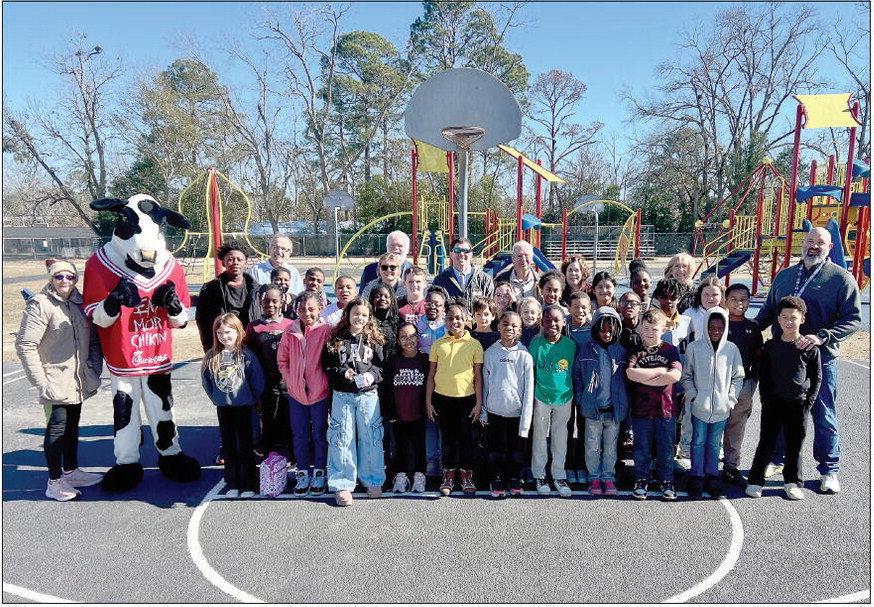continued from page System of ….


continued from page
System of Georgia to report, twice each year, any financial contributions it receives from foreign countries, entities, or individuals of concern. We want to know who is influencing our educational institutions and influencing our young people.
HB 268 is a comprehensive bill to provide for the safety, health, and wellbeing of students, faculty, staff, and visitors of our public schools. Among the requirements are panic alert buttons, school mapping, and the timely sharing of student records when a transfer occurs.
HB 340, the Distraction- Free Education Act, bans students in grades K through 8 from having cell phones in the classroom. Each school system must adopt policies that apply during class and at schoolsponsored events. This bill is in effect now, but the school policies are not required to be in place until July 1, 2026.
SB 1 mandates that all Georgia public school athletic programs designate teams and competitions as male, female, or coeducational. This applies to private schools that participate in interscholastic athletics with public schools. These policies take effect on July 1, 2026.
SB 79 increases criminal penalties for trafficking fentanyl. Anyone found in possession of four grams or more will now face a mandatory minimum sentence, with no chance of reduced penalties through judicial discretion.
SB 110 updates Georgia’s definition of child neglect. It ensures that parents are not penalized for allowing their children to engage in safe, independent activities like going to the park or riding their bike. This clarification helps protect parents while still prioritizing child safety. Tax Relief and Economic Policy Updates Tax policy was a central theme of the 2025 session. Several new laws aim to lower costs for families and small businesses.
HB 111 lowers Georgia’s flat individual income tax rate from 5.39% to 5.19%. The change took effect January 1, 2025. It reflects our broader effort to return taxpayer dollars to hardworking Georgians or, better yet, keep those hard-earned dollars in your pocket.
HB 266 increases the amount of military retirement income that can be excluded from state income taxes. For military retirees under the age of 65, the exemption has risen to $65,000.
HB 196 ensures that pharmacies filling prescriptions under the State Health Benefit Plan are fairly reimbursed. The law ties reimbursement to the national average drug acquisition cost and includes a required professional dispensing fee. This is a step in the right direction to treat locally-owned pharmacies the same as larger pharmacies.
HB 92 gives local governments new flexibility in managing homestead exemptions. Governing bodies that previously opted out of the statewide homestead exemption program can now rescind that decision through 2029. The law also makes it easier for property owners to transfer exemptions to surviving spouses and receive accurate tax notices. It went into effect April 1, 2025.
These changes are a few examples of legislation that passed in 2025 to reduce financial burdens and promote transparency. Focus on Rural Georgia
Several new Georgia laws are focused specifically on improving life in rural communities.
HB 567 allows licensed dentists to provide teledentistry services, making dental care more accessible in areas that lack providers. The law also ensures that dental insurance plans cover teledentistry services, just as they would cover in-person care. Requirements for patient safety, documentation, and privacy are all included. It will be in effect on January 1, 2026.
HB 172 improves the Veterinary Education Loan Repayment Program. Veterinarians can now qualify for up to $90,000 in loan repayment, paid out in $30,000 increments for each year of service. This program helps rural communities attract and keep qualified animal care professionals.
HB 223 exempts certain disaster-related payments from state income taxes. Farmers who received federal disaster aid or crop insurance payouts after Hurricane Helene will not owe state taxes on those funds for tax years 2024 through 2029. The law also creates a refundable timber tax credit and exempts materials used to rebuild damaged agricultural buildings from sales and use taxes. The effective date is May 8, 2025.
HB 398, which I sponsored, expands opportunities for small food entrepreneurs. The law allows cottage food operators to sell directly to consumers or to retail establishments. It offers a balanced approach that protects public health while supporting small business growth.
SB 201, which I sponsored in the House, protects homeowners from predatory contractors after natural disasters. Contractors who enter into an agreement within one year of a declared disaster must allow cancellation if insurance does not cover the damage. They must also inform homeowners of their cancellation rights in writing.
HB 167 gives hunters the option to wear fluorescent pink in addition to orange. Study Committees and Interim Work Although the legislative session has concluded, the work continues. I’m honored to serve on the House Study Committee on Improving Access to Internal Medicine in Underserved Areas. We plan to examine ways to recruit and retain physicians in rural Georgia, as well as consider different ways to administer care when there isn’t a doctors’ office relatively close by.
In addition, I continue to chair the House Rural Development Committee, where we will spend the remainder of the year looking at population growth strategies, economic investment, and ways to improve quality of life in small communities.
Several other House Study Committees are also active this year. Topics include pre-K student attendance, the affordability of Georgia’s legitimization process, and insurance coverage for essential industries. These committees conduct public hearings around the state and submit findings ahead of the next legislative session.
Closing Thoughts
These new Georgia laws are all about helping the people and communities that keep our state going. From better access to health care to fairer tax policies and simple protections that just make sense, these measures are shaped by the real needs we see every day.
If you have questions about these new laws or would like to share your thoughts on the year ahead, I welcome your input. You can reach me at contact@LeesaHagan.com. Together, we are making rural Georgia a better place to live, work, and raise a family.






